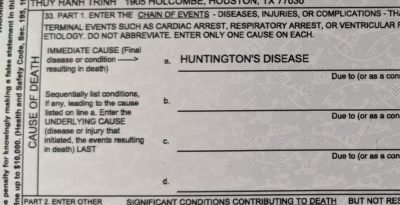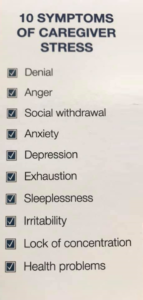This post describes, my recovery from the loss of my wife to a degenerative neurological condition called Huntington’s Disease. She was healed of this condition when she went to live with our Heavenly Father at 2:30AM, the 10th of January 2021. You can read the announcement here.
Or if you would like to read our story from the beginning, you can start with: How We Got Here…
The settling in process continues. For example, as I was writing this post the mail arrived with an envelope containing two copies of Janet’s death certificates. I guess it’s really official now.

I had a chance to go on a little local radio station this week to talk about caregiving and grief. The host and I talked for about half an hour, and he was wanting to go longer, but our time slot was up. So before we stopped, he asked me on the air if I would be willing to come back and continue the conversation. I agreed, so I will be doing it again, same 8:30 am time slot, on the 9th of April. Also I will be getting an audio recording of the radio conversation that I will be publishing as soon as I can.
Frannie also had a visitor this week ‒ her boyfriend from Houston flew up to visit. He is flying back down to Houston Sunday afternoon.
I had a doctor’s appointment Thursday to get hooked up with a new PCP (Primary Care Physician) after our move up here. My blood pressure is high (which I knew about) but he restarted me on meds for that. He also did an EKG and some blood work. My heart is good and my blood sugar is fine – to tell the truth, I had been a bit concerned about that.
The really interesting thing, though, is that when I mentioned that Janet had died of Huntington’s Disease, my new doctor told me he had been involved in treating members of three separate families in Mineral Wells (pop. 16,788) that had members with Huntington’s! You just never know…
❦ ❦ ❦ ❦ ❦ ❦
About a year ago when I first wrote about the connection between PTSD (Post Traumatic Stress Disorder) and caregiving, it was sort of a new idea, but now the connection is well established. This week I had another encounter with one of the hallmarks of PTSD: the flashback.
Flashbacks are when something occurs that puts the person back into a past situation emotionally. For example, in the past I have been triggered by fire alarms that sounded too much like a klaxon, and was put back into the mental state of trying to find my alert EC135 to run to, when there are, of course, remarkably few planes of any sort in downtown Waltham, Massachusetts. This week I got triggered again, but this time by a dream about being a caregiver.
In some ways, the exact circumstance of the dream is a little sketchy, but I remember that Janet was upset about something (I don’t remember what) and was yelling about it. And as had happened so often in real life, the more I tried to explain things, the angrier she got. I eventually awoke with a start, and I remember being stuck for a time in the same old conundrum of how to explain whatever the problem was in such a way that she would understand and calm down. After a few minutes of my mind and heart racing, trying to come up with a solution, I calmed down myself and realized that there was nothing to figure out and no crisis in need of a solution. But boy, it sure felt like there was a crisis…
But that is one of a flashback’s defining symptoms: your mind and body respond to the situation as though it were happening again. My mind was racing; my heart rate was up and I could hear my pulse pounding in my ears; my breaths were shallow and rapid; and I was sweating like mad.
Again I was reminded of what it felt like to be in a seemingly hopeless situation. Of course the situation wasn’t really hopeless – and not just because the situation was at its root a dream and so of questionable reality. But even when the situation that the dream was flashing back to was occurring in real life, it wasn’t hopeless. That was a lesson that I had to learn back then and is apparently one I needed a “refresher course” on, or perhaps a bit of continuing ed.
Which brought up for me an interesting thought: Perhaps learning from flashbacks is possible. I know that’s a curious, counter-intuitive thought, but stick with me here.
Flashbacks are by definition reliving a past experience that was stressful and even dangerous, but doing so in an environment that is often totally safe. For example, in this most recent case, I didn’t really have to worry about anything bad happening to me. After all, I was lying safe and alone in my bed. No monsters hiding in the closets, and no boogeymen (boogeypersons?) hiding under the bed. So if you think about it, what better way is there to work through fear and trauma than to replay it in a totally safe environment? This realization can be huge – especially if (like me) you are one of those people who always thinks of the thing that they should have said on the way home. Similarly, it is so easy to imagine later what I should have done when this or that happened to me.
Unfortunately, I find that too often I don’t want to actually resolve a situation, not really. Often my sights are set much shorter like merely avoiding the consequences, or figuring out how to hide the problem so I don’t have to think about it. Eventually however, the heartache, whatever it is, will come out – often at a time when I am least capable of dealing with it. For example, there are the WWII vets who have suppressed trauma related to their service for 70 years or more. Now they are suffering from Alzheimer’s or other conditions, and memories that they thought were stuffed down so far that they would never again see the light of day, are popping back up to the surface, multiplying the trauma they are experiencing.
So given these consequences, why would we not choose to really deal with a situation and have it be done with? After I toyed with that question long enough, I finally understood that the logical answer I was looking for didn’t exist. Logically, there is no reason to put off handling problems. One of the first lessons I learned as a little kid was to stand up and deal with the past and face the future – but why is doing that so hard?
As I have thought about it this week I have become convinced that it is not just about human cussedness – though that undoubtedly plays a large part. Sometimes we are told that “stuffing it” is the proper solution. We are told that big boys (or girls) don’t cry and no one wants to hear our troubles anyway. Sometimes it’s the feeling that is so prevalent in culture today, that if it hurts, it’s bad.
For caregivers, the problem can be procrastination born of emotional, spiritual or physical overload. I know that I always found it way too easy to say, “I’ll think about that tomorrow…” Then at some point, there is so much stuff put on hold that either “tomorrow” can’t hold any more or suddenly (as was my case) you aren’t a caregiver anymore, and the pile of things that you have been putting off comes crashing down on you like a high-country avalanche. The result is that now I am not only grieving, but also trying to deal with all the stuff that I kept putting off.
Still, looking to the future, my continuing prayer is that as I experience flashbacks, that God gives me the grace to learn from them what there is to learn, and not simply recoil in fear so the lesson has to be repeated again in the future. And as far as the flashback I had this week, well I’m still working on that one. So though, here at least, I will never be perfect, I can keep moving forward.
In Christ, Amen ☩
❦ ❦ ❦ ❦ ❦ ❦
A prayer for when your past is coming back to haunt you…
“Blessed are You, Lord God, King of the Universe. It is right that I should at all times and in all circumstances bless You for the perfection with which You work together the intricacies of creation. But today I want to bless You especially for the wondrous and, at times, mysterious ways in which You weave together my life. I have seen Your glory shining is my mornings and Your majesty filling my nights. Amen.”


